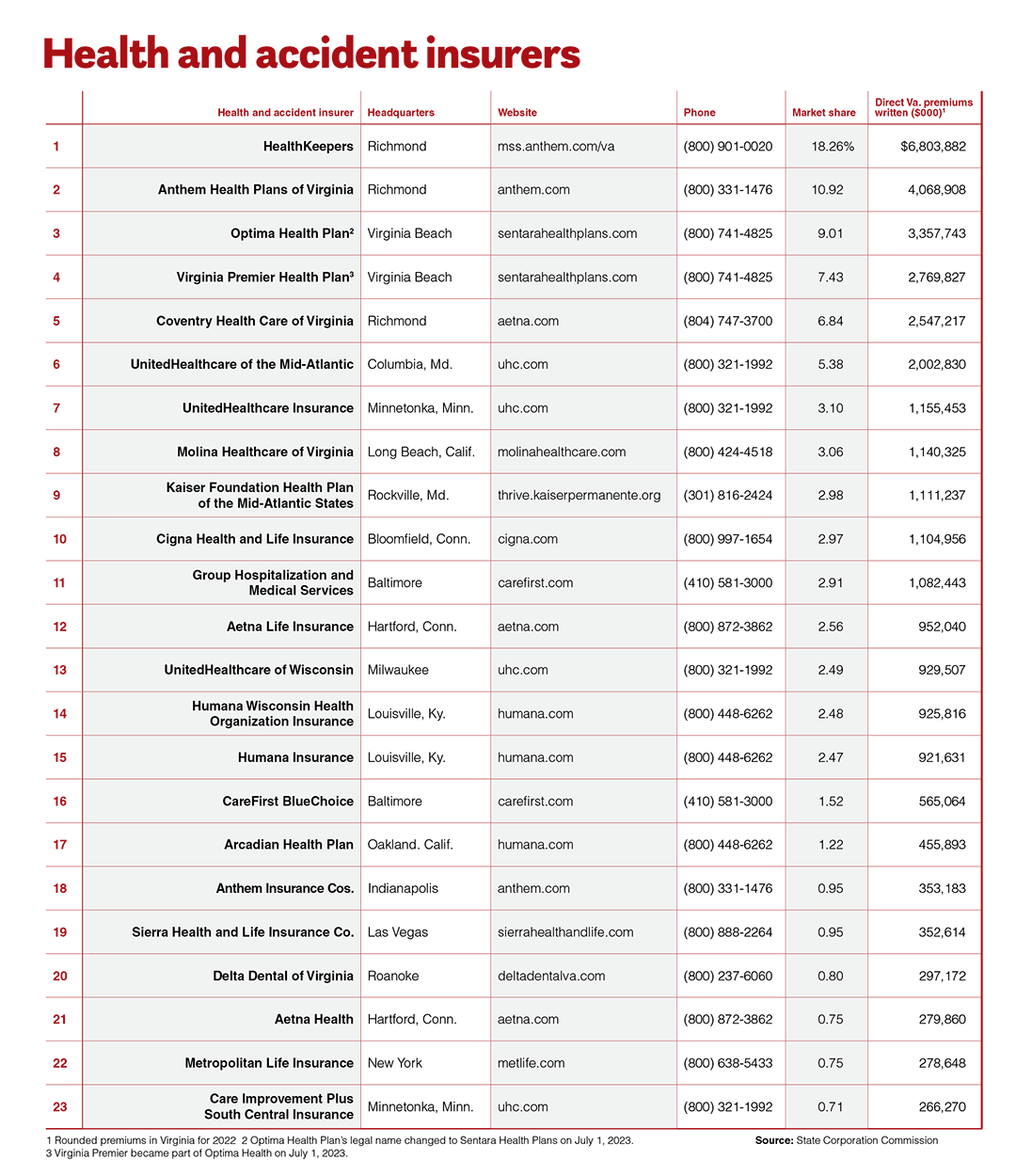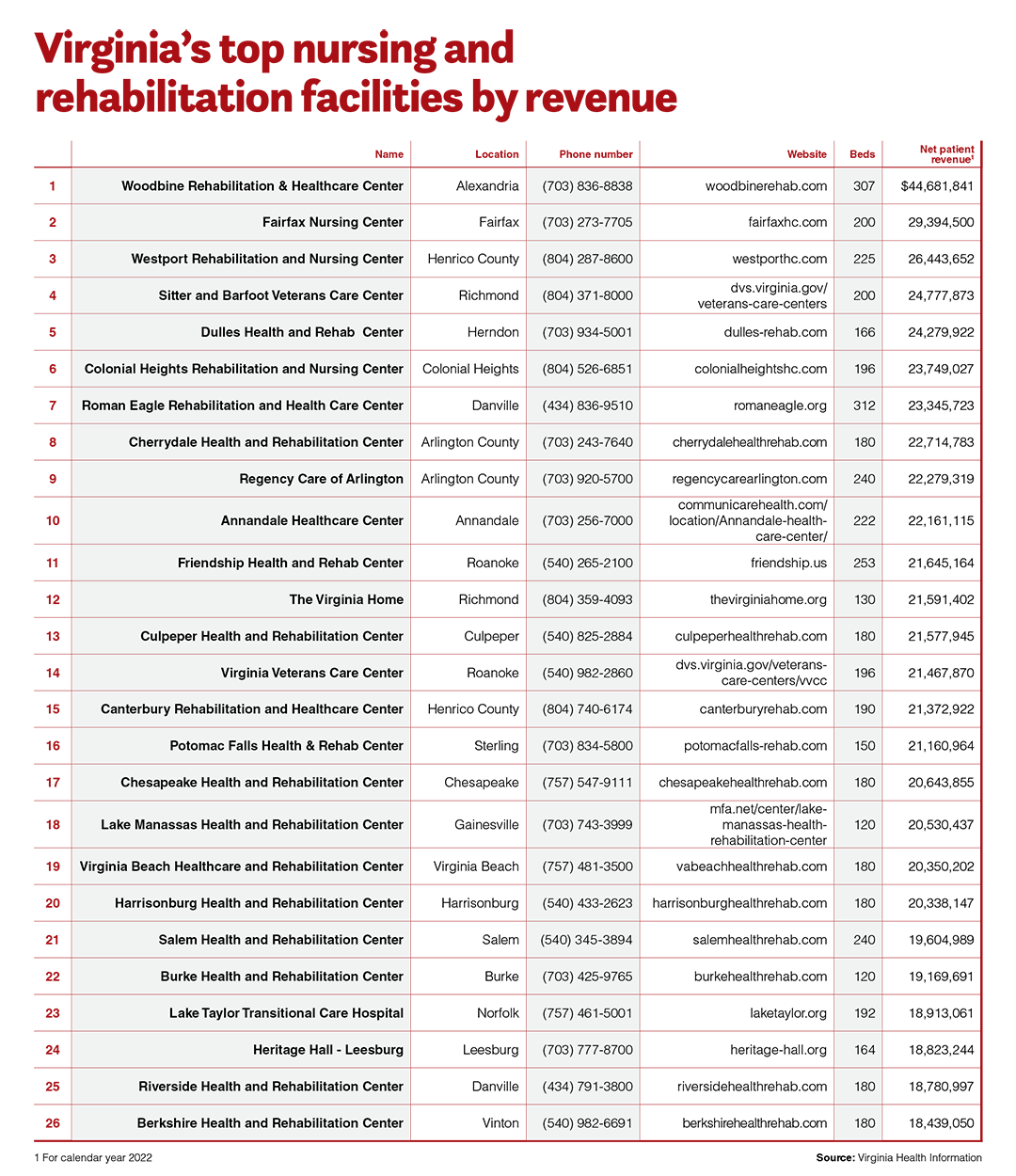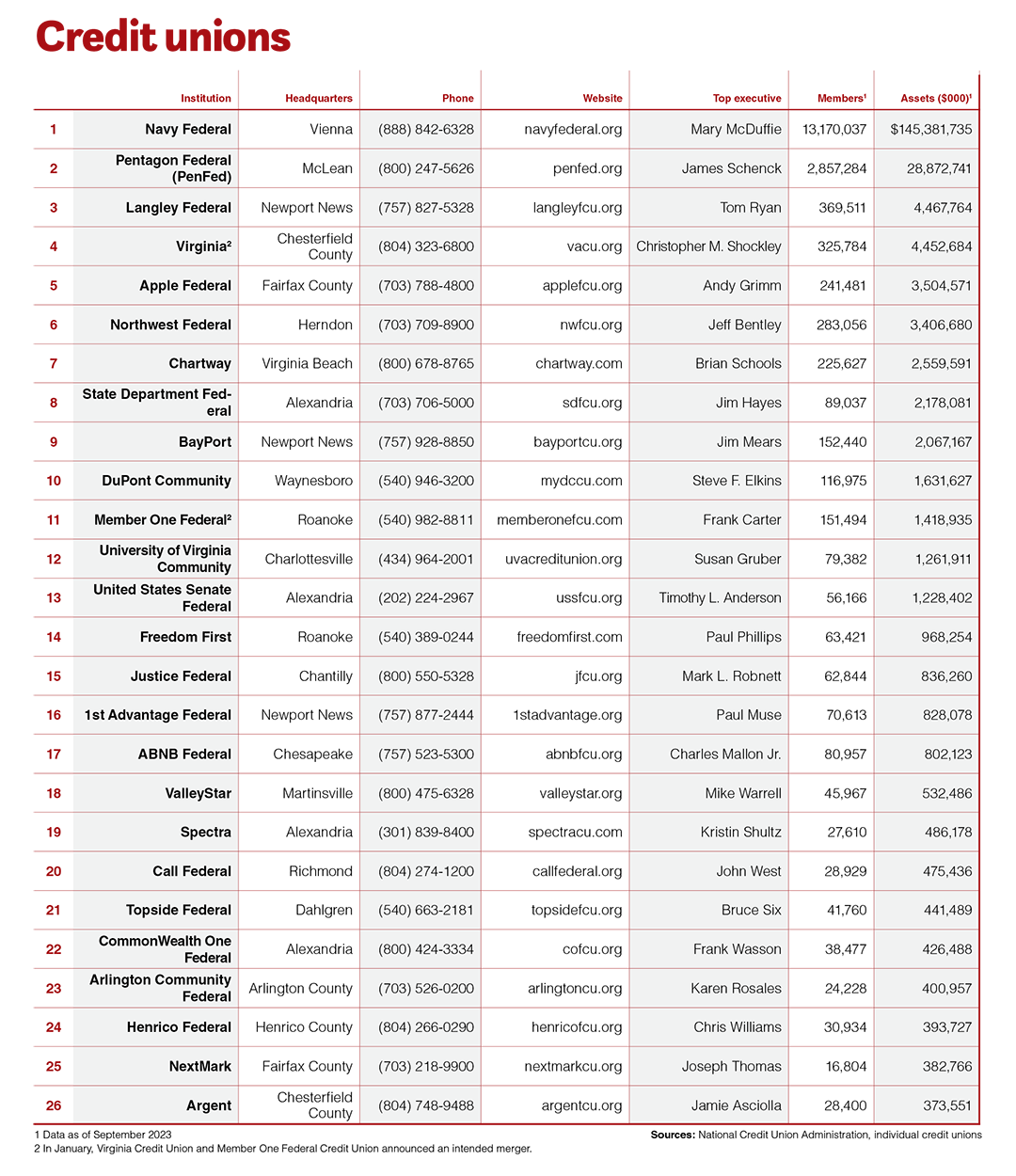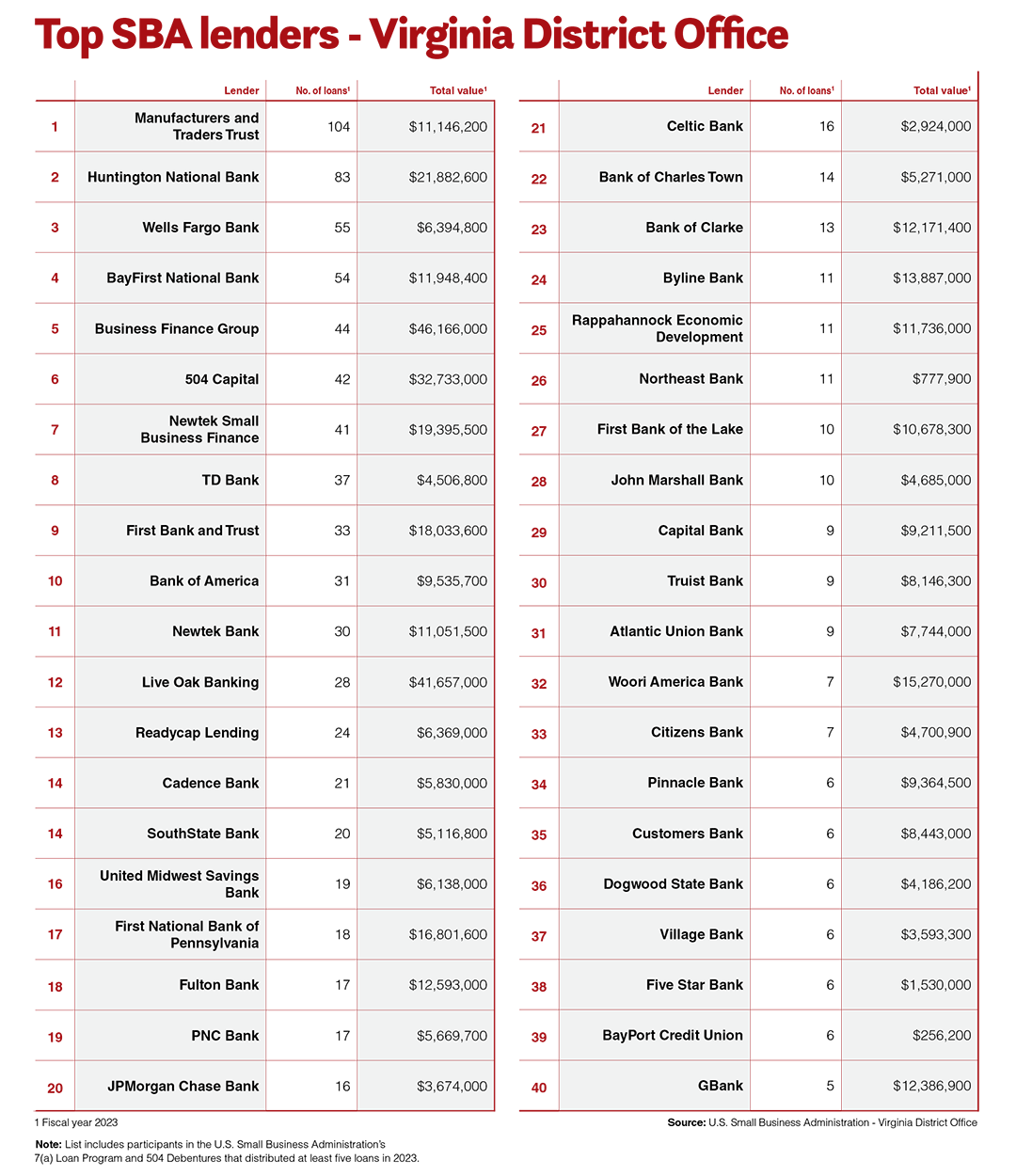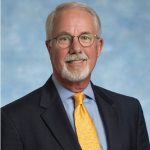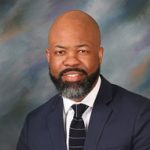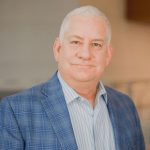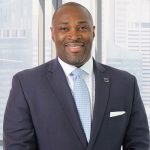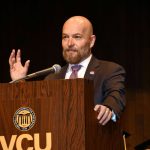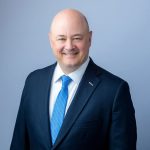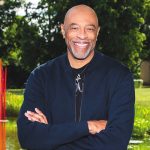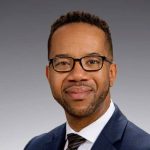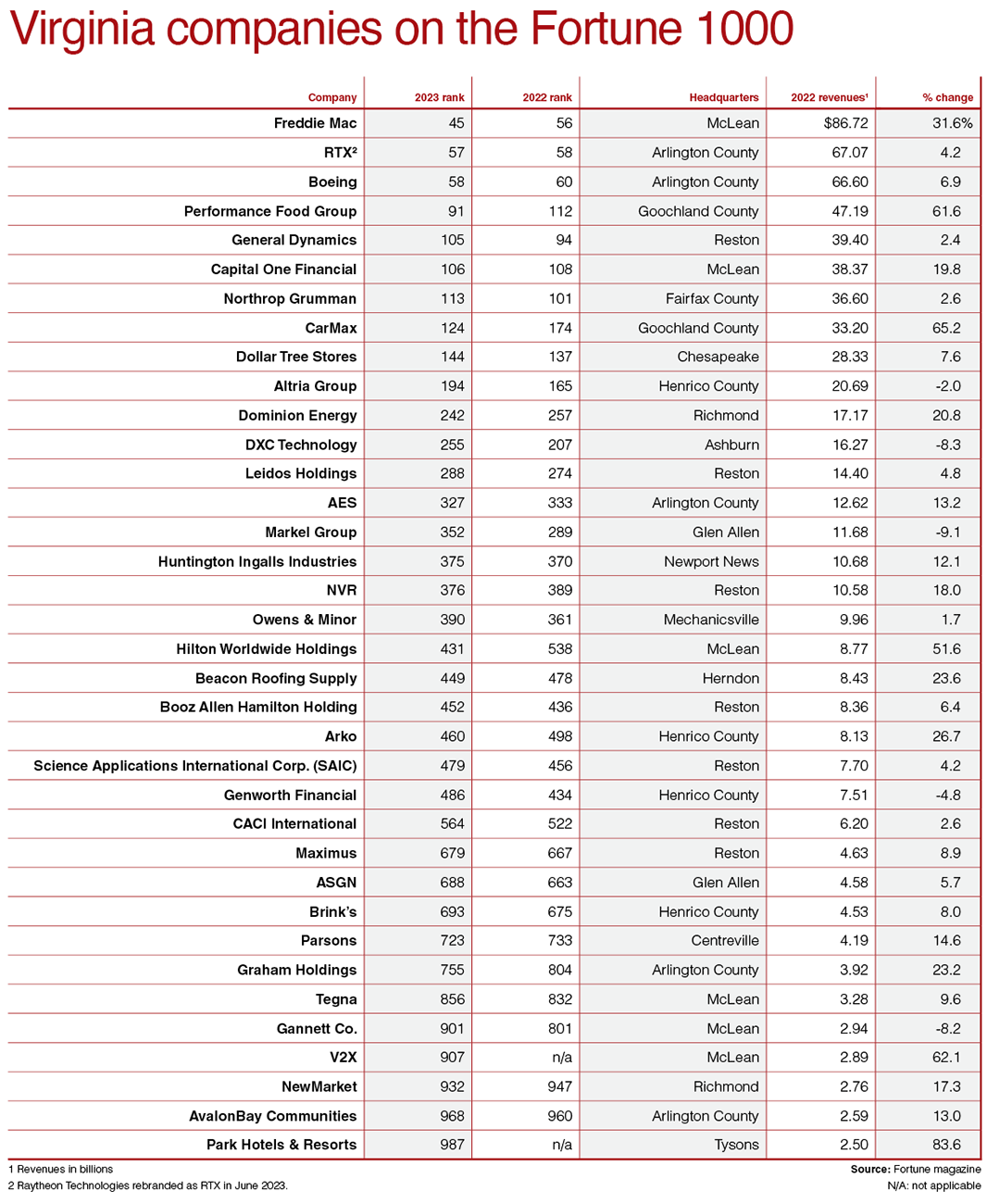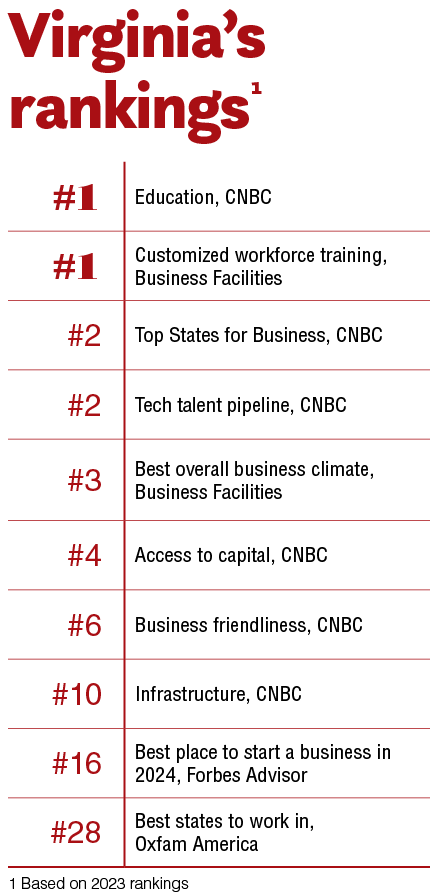Power can be measured by metrics such as wealth and how many people you lead, as well as what one does with that power. Is your company undertaking bold growth strategies? Are you the visionary executive leading huge initiatives? Are you bringing massive infrastructure projects to fruition or making seismically impactful philanthropic contributions?
In previous years, this annual list focused on the dual aspects of how powerful and/or influential a person was, but for the 2024 list, Virginia Business is solely focused on power, which is arguably a less subjective exercise.
While it’s still a matter of opinion, it’s not too difficult a decision to include leaders such as Gov. Glenn Youngkin or Accenture CEO Julie Sweet, who leads a global workforce of 733,000, on this list.
That said, you’ll notice some changes this year. The people on this list are the top 10% of our annual Virginia 500 list of the state’s most powerful people across 20 sectors, ranging from real estate and manufacturing to higher education and government. They also include some people from our Virginia 500 Living Legends list, such as billionaire heiress Jacqueline Mars, the 19th richest American.
As with the Virginia 500, to report an accurate picture of who holds the most power in Virginia, we have not attempted to adjust this list for diversity or geography. As such, it skews largely white and male, reflecting the larger demographics of American business and political leadership.
Read on to learn who made the cut this year and how they’re making a lasting impact on Virginia’s bottom line.
 Craig P. Abod
Craig P. Abod
PRESIDENT AND FOUNDER, CARAHSOFT TECHNOLOGY, RESTON
As president of Carahsoft, the privately owned IT and cybersecurity solutions provider, Abod prefers staying out of the media spotlight. It’s enough that everyone in the government contracting industry knows him.
A University of Maryland alumnus who founded Carahsoft in 2004, Abod previously worked for DLT Solutions and Falcon Systems.
Carahsoft landed at No. 45 on Forbes’ 2023 list of the nation’s largest private companies, with $11 billion in revenue and 2,470 employees.
The company is one of two firms modernizing federal payroll services under a U.S. General Services Administration contract, and in July 2023, Carahsoft announced it would market Palantir Technologies’ software management platform, Apollo, to the public sector through its GSA and NASA contract vehicles.
About 1,300 of Carahsoft’s employees are based in Virginia. In 2023, Abod was named for the ninth time to Executive Mosaic’s Wash100 List of the top government contracting executives.
 Nancy Howell Agee
Nancy Howell Agee
CEO, CARILION CLINIC, ROANOKE
In addition to overseeing Carilion, a $2 billion-plus health system serving more than 1 million people in western Virginia and West Virginia, Agee chairs one of the state’s most powerful boards: GO Virginia, a state-funded initiative to boost job creation and economic growth.
Carilion employs about 14,000 people across its seven hospitals and 250 clinics and has a physician group with more than 1,000 doctors, plus outpatient clinics, home health services, freestanding surgical clinics and pharmacies. In fiscal 2022 and 2023, the hospital system ran negative operating margins — attributed to a tight health care labor market — but Agee said in September 2023 she expects Carilion to return to a positive operating margin in FY 2024.
Before becoming president and CEO in 2011, Agee served as executive vice president and chief operating officer, helping lead Carilion’s reorganization from a collection of hospitals to a fully integrated health system. The reorganization resulted in a partnership with Virginia Tech to create the Virginia Tech Carilion School of Medicine and Research Institute based in Roanoke.
 John C. Asbury
John C. Asbury
CEO, ATLANTIC UNION BANKSHARES, RICHMOND
Discovering an affinity for banking while still in college, Asbury began his 30-year-plus career as a commercial credit officer at Wachovia Bank & Trust and joined Atlantic Union in 2016.
Asbury had a big 2023: He was tapped as chair-elect of the American Bankers Association for the 2023-24 year, and Atlantic Union announced in July its pending purchase of Danville-based American National Bankshares, the holding company for American National Bank and Trust. The merger, which was approved by the Federal Reserve’s Board of Governors in late February, is expected to close on April 1, creating a combined bank with total assets of $23.7 billion as of June 30, 2023. With 109 branches, Atlantic Union Bank reported $20.6 billion in assets and $15.7 billion in deposits last year.
However, in December 2023, the Consumer Financial Protection Bureau fined Atlantic Union for illegally enrolling thousands of customers in checking account overdraft programs. The federal bureau ordered the bank to refund at least $5 million in illegal overdraft fees and pay a $1.2 million penalty to the CFPB’s victims relief fund. The bank did not admit wrongdoing under the settlement.
 G. Robert Aston Jr.
G. Robert Aston Jr.
EXECUTIVE CHAIRMAN, TOWNEBANK, SUFFOLK
When he founded TowneBank in 1999, Aston had a vision of creating a Main Street bank that would be focused exclusively on serving the people and businesses in its hometown. Today, TowneBank has
50 locations in Virginia and North Carolina, with assets of more than $17 billion and 1,200 employees.
Aston served as board chairman and CEO from the founding of the bank until 2018, when he transitioned to executive chairman. Prior to starting TowneBank, Aston served as president and CEO of Virginia Beach-based Commerce Bank from 1985 until BB&T acquired it in 1995. He then served as president and CEO of BB&T of Virginia from 1995 to 1998. In 2022, Aston was named to Eastern Virginia Medical School’s board of visitors.
In January 2023, TowneBank completed its $53 million acquisition of Windsor-based Farmers Bankshares and its subsidiary, Farmers Bank. The bank also has received six consecutive “outstanding” ratings from the Federal Deposit Insurance Corp. for its Community Reinvestment Act (CRA) performance, evaluating the bank’s performance on meeting credit needs of its service areas, including low- and middle-income clients.
 Thomas I. Barkin
Thomas I. Barkin
PRESIDENT AND CEO, FEDERAL RESERVE BANK OF RICHMOND, RICHMOND
Barkin became head of the Richmond Fed in 2018, overseeing the Central Bank’s Fifth District, including Washington, D.C., Virginia, Maryland, Delaware, North and South Carolina and most of West Virginia. He also serves as a voting member of the Fed’s interest-setting Federal Open Market Committee for 2024. Barkin is also a board member for the nonprofit Community Foundation for a greater Richmond.
Formerly chief financial officer and chief risk officer for global consultancy McKinsey & Co., Barkin also served on the board of directors for the Federal Reserve Bank of Atlanta, chairing the board for a year. In January, Barkin delivered a relatively positive economic outlook, noting that the U.S. unemployment rate of 3.7% was “historically low,” and the inflation rate had fallen to 2.6% in November 2023, from a high of 8% in 2022. However, he added, rate hikes are still possible if inflation rises again.
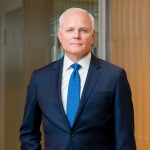 Thomas A. Bell
Thomas A. Bell
CEO, LEIDOS, RESTON
In 2023, Bell became CEO of Leidos, a Fortune 500 defense, aerospace and information technology company, replacing Roger Krone, who retired that month as CEO and board chairman after nine years.
The IT and government contractor reported $14.4 billion in fiscal year 2022 and employs 47,000 people worldwide. During Leidos’ third-quarter earnings call, Bell announced plans to realign five business units into five new divisions, as well as adding a new chief growth officer and chief performance officer to the C-suite. The company also expects a boost in revenue after winning a 10-year, $7.9 billion Army contract last fall. That win came after Leidos reported an income loss of $396 million, reflecting $699 million in impairment and restructuring charges in its Security Enterprise Solutions unit.
Bell came to Leidos from Rolls-Royce North America, where he had been chairman and CEO since 2018, as well as head of the British company’s global defense contracting division. He previously was Boeing’s senior vice president of global sales and marketing for defense, space and security.
Bell earned his bachelor’s degree from Louisiana State University and an MBA from the Florida Institute of Technology. He serves on the Aerospace Industries Association’s executive committee.
 Brendan Bechtel
Brendan Bechtel
CHAIRMAN AND CEO, BECHTEL CORP., RESTON
Serving as CEO since 2016 and chairman since 2017, Bechtel is the fifth generation to lead his family-owned global engineering, construction and project management company, which turned 125 in 2023. Ranked the nation’s second largest construction company by Engineering News-Record, Bechtel Corp. has completed more than 25,000 projects in 160 countries since its 1898 founding in San Francisco.
The firm’s portfolio includes massive infrastructure and industrial projects across the world, and also is involved in defense and space projects. Among Bechtel’s largest projects is a $3 billion Waste Isolation Pilot Plant management and operation contract awarded by the Department of Energy’s Office of Environmental Management in 2022.
A graduate of Middlebury College and Stanford University, Brendan Bechtel managed the building of the Washington Metro Silver Line in Fairfax and Loudoun counties, and was part of former President Donald Trump’s advisory panel on economic recovery from the pandemic.
Bechtel sits on the board for the Business Roundtable and is also a trustee for the National Geographic Society and the Center for Strategic and International Studies.
 Robert M. ‘Bob’ Blue
Robert M. ‘Bob’ Blue
CHAIRMAN, PRESIDENT and CEO, DOMINION ENERGY, RICHMOND
Dominion’s CEO since 2020, Blue leads the Fortune 500 utility’s approximately 17,000 employees, serving 7 million customers in 15 states. A University of Virginia and Yale Law School graduate, Blue joined the utility in 2005 as managing director of state affairs and corporate policy.
Right now, Dominion is focused on renewable energy, including its $9.8 billion, 176-turbine offshore wind farm under construction off the coast of Virginia Beach. The utility also is selling off some of its holdings, including three natural gas distribution companies sold for $14 billion to Canadian pipeline and energy company Enbridge in September 2023. Also, Dominion completed the $3.5 billion sale of its stake in the Cove Point natural gas liquefaction plant in Maryland to Berkshire Hathaway Energy in September, after canceling its plans for the Atlantic Coast Pipeline.
In November 2023, Dominion Energy Virginia reached an agreement with state agencies and corporations, including Google and Walmart, in which customers will see no increase in base rates for electric service over the next two years.
Blue serves as vice chairman of the Nuclear Energy Institute board and is a member of the University of Virginia’s board of visitors.
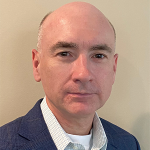 Eugene J. Bredow
Eugene J. Bredow
PRESIDENT AND CEO, NVR, RESTON
In 2022, Bredow was appointed president and CEO of NVR, one of the country’s largest homebuilding and mortgage banking companies, which operates under the Ryan Homes, NVHomes and Heartland Homes brands. He joined the company in 2004 and held several executive positions before rising to president of NVR’s mortgage arm in 2019.
Founded in 1980, NVR reported $9.79 billion in revenue for the year ending Sept. 30, 2023, a 2.46% decline year- over-year. Nonetheless, the Oracle of Omaha sees something worthwhile in NVR, as Warren Buffett’s Berkshire Hathaway purchased more than 11,000 shares of NVR stock in August 2023.
Bredow is a graduate of the University of Maryland Robert H. Smith School of Business and serves as a member of its board of advisers.

David Calhoun
PRESIDENT AND CEO, BOEING, ARLINGTON COUNTY
In January, a 4-foot wall panel blew out of a Boeing 737 Max 9 jet cabin, exposing terrified Alaska Airlines passengers to open air at 16,000 feet. Reports followed that the panel was missing bolts and Alaska Airlines found loose bolts on other Boeing aircraft. Amid questions about whether Boeing cut corners on quality control, the incident is under investigation by the National Transportation Safety Board and the Federal Aviation Administration. The FAA halted expanded production of the 737 Max, and customer United Airlines has approached competitor Airbus. Boeing reported that it had net-zero orders for new commercial aircraft during January.
Now Calhoun’s position leading the embattled defense giant is precarious, with one industry veteran telling Reuters in February, “I can’t see how the CEO can survive and how he should survive.”
A Virginia Tech alumnus, Calhoun has steered Boeing through strong headwinds since becoming its CEO in 2020, including the aftermath of two deadly 737 Max crashes. He has said Boeing will “cooperate fully and transparently” with federal investigators in the most recent probe.
Calhoun previously held C-suite positions at Blackstone, Nielsen Holdings and General Electric. Boeing, which moved its headquarters to Arlington from Chicago in 2022, has about 140,000 employees worldwide, including 400 workers in Arlington.
 Kristen Cavallo
Kristen Cavallo
CEO, MULLENLOWE GLOBAL, RICHMOND
Named CEO of MullenLowe Global ad agency in November 2022, Cavallo is responsible for 4,500 employees, with offices in 55 markets worldwide. With clients including Google, Unilever, Anheuser-Busch InBev and UPS, it’s been recognized as one of the world’s top ad agencies.
In February, Cavallo stepped down from her dual role as CEO of Richmond’s The Martin Agency, a role she had held since 2017, when she took over in the aftermath of a #MeToo crisis at the ad agency. During her tenure, Martin was also recognized multiple times as U.S. agency of the year by Adweek and Ad Age. Last year, Fast Company named Martin as one of the most innovative companies in advertising.
Danny Robinson, the agency’s chief creative officer, succeeded her as Martin’s CEO. Martin and MullenLowe are both owned by the Interpublic Group of Companies (IPG).
A graduate of James Madison University and George Mason University, Cavallo was Virginia Business’ 2023 Person of the Year.
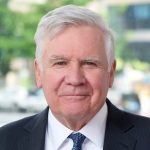 William E. Conway Jr.
William E. Conway Jr.
CO-CHAIRMAN, CO-FOUNDER, THE CARLYLE GROUP, McLEAN
Conway is one of the Carlyle Group’s three founders, as well as a former co-CEO of the Washington, D.C.-based private equity firm that manages more than $380 billion in assets. With a net worth of $3.5 billion, Conway is one of Virginia’s wealthiest people. In October 2023, he and co-founder David Rubenstein invested in Alterra Capital Partners’ fund supporting African industries.
Before co-founding Carlyle, Conway, a graduate of Dartmouth College, was chief financial officer of MCI Communications. According to Forbes, he sold Jackie Onassis’ childhood home, Merrywood, in McLean to former AOL CEO Steve Case for $24.5 million in 2005. Conway and his late wife, Joanne Conway, started the Bedford Falls Foundation, which has given more than $400 million to mid-Atlantic charities. In 2022, the foundation gave $13 million to the Virginia Commonwealth University School of Nursing, the school’s largest gift, and in 2020, the Conways donated $20 million to the University of Virginia School of Nursing.
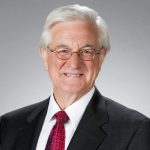 Rick Dreiling
Rick Dreiling
CEO, DOLLAR TREE, CHESAPEAKE
The former CEO of Dollar Tree rival Dollar General, Dreiling became Dollar Tree’s executive chairman in March 2022 and its CEO in January 2023, replacing Mike Witynski. Revenue at the discount retailer is rebounding under Dreiling; its revenue for the 12 months ending Oct. 31, 2023, was $29.68 billion, up 7.64% from 2022.
Dreiling serves as lead independent director on Lowe’s board and has also served as president and CEO of pharmacy and convenience store chain Duane Reade.
Dollar Tree operates more than 16,000 Dollar Tree and Family Dollar stores and employs more than 200,000 people. It ranked No. 144 on the 2023 Fortune 500 list. According to CoStar, Dollar Tree is considering closing some of its underperforming Family Dollar stores, a project that will take months to complete.
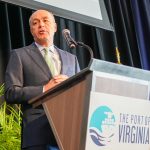 Stephen A. Edwards
Stephen A. Edwards
CEO AND EXECUTIVE DIRECTOR, VIRGINIA PORT AUTHORITY, NORFOLK
With oversight of the entire Port of Virginia system, Edwards is responsible for its marine terminal facilities in Hampton Roads as well as the Virginia Inland Port in Front Royal.
Formerly CEO of TraPac, Global Container Terminals and Ports America, Edwards joined the port authority in January 2021 during the pandemic, a challenging time for the maritime industry. However, the Port of Virginia fared well, processing record cargo.
In 2022, the port processed more than 3.7 million 20-foot-equivalent units at its terminals, and cargo tonnage was up 11% from 2021. For fiscal 2022, the port generated $124.1 billion in output sales, $41.4 billion in Virginia labor income and $5.8 billion in state and local taxes and fees.
Like other ports, Virginia has seen shipping delays in recent months due to Houthi attacks on merchant ships in the Suez Canal and a drought impacting the Panama Canal.
A graduate of England’s Aston University, Edwards also serves on the Virginia Economic Development Partnership’s board as an ex officio member.
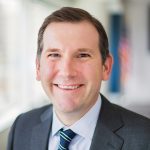 Jason El Koubi
Jason El Koubi
PRESIDENT AND CEO, VIRGINIA ECONOMIC DEVELOPMENT PARTNERSHIP, RICHMOND
El Koubi has headed up Virginia’s top economic development organization since March 2022, following a five-year stint as VEDP’s executive vice president. Part of the team that helped land Amazon.com’s $2.5 billion-plus HQ2 East Coast headquarters in Arlington County, El Koubi continues to rack up big economic wins for the commonwealth, such as 2022’s announcement that Lego Group would establish a $1 billion factory in Chesterfield County.
A graduate of Louisiana State University and the London School of Economics and Political Science, El Koubi previously led One Acadiana, the former Greater Lafayette Chamber of Commerce in Louisiana, where he started a five-year, $15 million regional economic development program to expand businesses in the region.
He serves on the Virginia Early Childhood Foundation board and is an ex officio member of the State Council of Higher Education for Virginia.
 Richard Fairbank
Richard Fairbank
CO-FOUNDER, CHAIRMAN AND CEO, CAPITAL ONE FINANCIAL, McLean
Capital One and Fairbank made global headlines on Feb. 19 as news broke of the credit card banking behemoth’s bold proposal to acquire Discover Financial Services in a $35.3 billion, all-stock deal. It remains uncertain if the transaction will receive a green light from federal regulators, but if approved, it would reportedly create the the nation’s biggest credit card lender. Capital One has said it plans to close the deal by early 2025.
Fairbank is listed as having a net worth of $1.1 billion, but he receives a base salary of $0 from Capital One, which he co-founded in 1994 and now has $455 billion in assets. Nevertheless, he was the state’s top-compensated CEO in 2022, receiving $27.6 million, a 35% increase from 2021.
As an employee of Virginia’s Signet Bank, Fairbank co-founded a credit card spinoff business that became Capital One, now one of the country’s 10 largest banks. Fairbank became CEO in 1994 during Capital One’s initial public offering. Under his leadership, Capital One is moving strongly into digital banking. The bank’s net revenue increased 13% to $34.3 billion in 2022. Meanwhile, in July 2023, Capital One announced net income of $1.4 billion for the year’s second quarter, up from $960 million in the first quarter.
Known for its star-studded commercials featuring luminaries like Samuel L. Jackson and Taylor Swift, Capital One moved to permanent hybrid work schedules in 2021, and in May 2023 the company required employees to be in offices three days a week.
 Raul Fernandez
Raul Fernandez
PRESIDENT AND CEO, DXC TECHNOLOGY, ASHBURN
In February, Fernandez was named president and CEO of the Fortune 500 IT company after having served in an interim capacity for less than two months.
Fernandez, who succeeds former DXC CEO Mike Salvino, joined DXC’s board in 2020, following a long career in tech. He founded Proxicom, an e-commerce company, in 1991, and was later CEO of Dimension Data North America and then CEO of ObjectVideo, which Alarm.com acquired in 2017.
Fernandez also is a vice chairman of Monumental Sports & Entertainment and a co-owner of the Washington Capitals, Washington Wizards and Washington Mystics teams, as well as an alternative governor for the NBA Board of Governors and a director on Broadcom’s board. Monumental is currently pursuing a $2 billion deal supported by Gov. Glenn Youngkin to move the Capitals and Wizards to Alexandria.
DXC has more than 131,000 employees and reported $14.4 billion in revenue for fiscal 2023.
 Julian G. Francis
Julian G. Francis
PRESIDENT AND CEO, BEACON ROOFING SUPPLY, HERNDON
Francis joined Beacon Roofing Supply, a Fortune 500 distributor of roofing material and complementary building products, in 2019. Beacon has 7,400 employees and operates in all 50 U.S. states and in Canada.
The United Kingdom native and two-time Swansea University graduate previously served as president of the insulation business at Owens Corning, a provider of insulation, roofing and fiberglass composite materials. He was also vice president and general manager for Owens Corning’s residential insulation business and vice president and managing director of the company’s glass reinforcements business in the Americas. Francis has also worked for Reed Business Information and USG.
In April, Beacon acquired Al’s Roofing Supply in California and Prince Building Systems in Wisconsin. Beacon reported $8.43 billion in revenue for fiscal year 2022, and its net sales for 2023 are expected to be about $9.1 billion.
 Thomas S. Gayner
Thomas S. Gayner
CEO, MARKEL GROUP, GLEN ALLEN
In 2023, Gayner became Markel’s sole CEO after serving more than six years in an unusual co-CEO arrangement with Richard Whitt III, who retired after more than two decades at the Fortune 500 insurer and holding company. Gayner, also chief investment officer, joined Markel in 1990.
As CEO, Gayner oversees three divisions: insurance, investments and Markel Ventures, which owns and operates a family of independent subsidiaries ranging from luxury purse maker Brahmin to Eagle homebuilders.
Markel reported operating revenue of $11.7 billion in 2022 and has more than 20,000 employees worldwide, including 2,700 in Virginia. In May, the company changed its name from Markel Corp. to Markel Group to better reflect its diverse holdings.
A University of Virginia graduate, Gayner previously served as a vice president at Davenport and was a CPA for PricewaterhouseCoopers. He is also chairman of the board for Davis Series Mutual Funds and a board director for Graham Holdings. In July 2023, he was elected to Coca-Cola’s board of directors.
In April, he and his wife, Susan, started the Gayner Family Sustainable Investment Fund and Scholarship Program, supporting students at U.Va.’s McIntire School of Commerce.
 William ‘Billy’ Gifford Jr.
William ‘Billy’ Gifford Jr.
CEO, ALTRIA GROUP, HENRICO COUNTY
Gifford became Fortune 500 tobacco products manufacturer Altria’s CEO in 2020, after having served as president and CEO of subsidiary Philip Morris USA and holding other executive posts at Altria for the past 25 years.
After four challenging years, during which Altria saw the value of its 35% stake in Juul Labs’ e-cigarette company plummet from $12.8 billion to $250 million by the end of 2022, the tobacco manufacturer exchanged its minority stake in Juul in 2023 for a nonexclusive license to some of Juul’s heated tobacco intellectual property. Also in March, Altria agreed to acquire e-vapor maker NJOY Holdings for $2.75 billion in cash, and in May, the company settled at least 6,000 state and federal lawsuits related to Juul for $235 million. Shortly after Altria invested in Juul, the vaping company was sued by numerous states and individuals over accusations its products were being marketed to minors.
In October 2023, NJOY filed a federal lawsuit against nearly three dozen e-vapor manufacturers, distributors and retailers, claiming that they are violating California’s flavored vape ban, and Altria said it may add other businesses to the complaint.
 Andrés Gluski
Andrés Gluski
PRESIDENT AND CEO, AES, ARLINGTON COUNTY
A Venezuelan native, Gluski was a leader in renewable energy production and carbon emissions reduction even before 2011, when he became head of AES, a Fortune 500 global electric utility that provides power to 2.6 million customers in 14 countries. In fiscal year 2022, AES reported $12.6 billion in revenue, up from $11.1 billion in 2021, and had $38 billion in total assets.
Gluski joined the company in 2000 and has served in several executive roles, including president of its Latin American arm and CEO of Chile-based AES Andes. In 2021, Gluski announced AES’ plan to reach net-zero carbon emissions from electricity sales by 2040, using power storage as a major component. He also has pushed solar farms and in 2018 established a jointly owned solar power storage company, Fluence Energy, with Siemens Energy. In June 2023, AES acquired one of the nation’s largest solar storage facilities, located in California, from Avantus.
Gluski earned his master’s degree and doctorate in economics from the University of Virginia. He chairs the boards of the Council of the Americas, which promotes free trade and open markets in the Americas, and the Americas Society, which works to build dialogue and awareness of political, social and economic issues in the two continents.
 William H. ‘Bill’ Goodwin Jr.
William H. ‘Bill’ Goodwin Jr.
RETIRED CHAIRMAN, CCA INDUSTRIES AND THE RIVERSTONE GROUP, RICHMOND
Goodwin may be officially retired, but he’s still very active in medical philanthropy and economic development.
He has donated generously to various cancer research organizations, and in 2021, the estate of his late son, Hunter, started a national cancer research foundation with a $250 million donation. The Red Gates Foundation went on to make a $50 million gift to support cancer and neuroscience research at the Fralin Biomedical Research Institute at VTC in September 2023.
Goodwin also has been active in Richmond-region land sales, having sold 110 acres in Henrico County to the county’s economic development authority in September 2023 for $35.1 million for the GreenCity eco-district, as well as a 3.6-acre plot in Chesterfield County sold to Costco last fall.
CCA is a diversified holding company that oversees The Riverstone Group and its properties, which include The Jefferson Hotel, Sea Pines Resort, Kiawah Island Golf Resort and Charlottesville’s Keswick Hall and Golf Club. A graduate of Virginia Tech and the University of Virginia’s Darden School of Business, Goodwin has served on multiple powerful boards, including as U.Va.’s rector and president of the Medical College of Virginia Foundation.

Jonathan P. Harmon
CHAIRMAN, McGUIREWOODS, RICHMOND
In 2017, Harmon became the leader of Virginia’s oldest law firm, which had 300 lawyers in Virginia as of November 2023. A nationally recognized trial lawyer, he brings in millions of dollars representing Fortune 500 companies in bet-the-company
litigation actions and has represented giants like DuPont, CSX Transportation and UPS Ground Freight.
In 2023, Harmon told Bloomfield Law that the firm — the nation’s 50th largest by number of attorneys — has been eyeing expansions in Atlanta, California, Chicago, New York and Texas. McGuireWoods had about 1,000 attorneys nationwide as of later 2023, and it reported $977.4 million in 2022 revenue, up from $715.4 million in 2017. The firm has also expanded its areas of expertise, building a DEI practice team and hiring a chief innovation and artificial intelligence officer.
A West Point graduate, Harmon earned his law degree from the University of Texas School of Law and served in the Gulf War. Outside of work, the father of four serves on the Pro Bono Institute’s board of trustees and does volunteer and ministry work in prisons.
 George L. Holm
George L. Holm
CHAIRMAN, PRESIDENT AND CEO, PERFORMANCE FOOD GROUP, GOOCHLAND COUNTY
Performance Food Group’s leader since 2008, Holm has worked for more than 40 years in the food service distribution industry. The Goochland-based corporation was ranked No. 91 on the 2023 Fortune 500, reporting $47.19 billion in revenue for fiscal 2022, up from $30.39 billion in 2021.
After holding leadership roles with Sysco, US Foods and Alliant Foodservice, Holm was president and CEO of Vistar, a multichannel food, snack and beverage distributor. In 2008, the Blackstone Group and Wellspring Capital Management purchased PFG and merged it with a subsidiary of Vistar, creating a $10 billion corporation still carrying the PFG name. Holm became the new company’s president and CEO as part of the $1.4 billion deal.
PFG, which employs 35,000 people, went public in 2015, and Holm became its board chairman in 2019. PFG delivers food products to more than 300,000 locations in the United States and Canada, including restaurants, businesses, schools, theaters and retailers. In 2023, PFG purchased OLM Food Solutions, an Idaho-based pizza producer, for an undisclosed amount.
 Brian Huseman
Brian Huseman
VICE PRESIDENT OF PUBLIC POLICY, AMAZON.COM, ARLINGTON COUNTY
Huseman is Amazon.com’s most prominent executive in Arlington, where the e-tailer held a grand opening for the first phase of its HQ2 East Coast headquarters campus in June 2023. A few months earlier, Amazon said it would pause construction on the project’s second phase, although it still plans to ultimately employ 25,000 people at HQ2, where it has hired about 8,000 workers so far. Statewide, Amazon has more than 36,000 employees.
A former U.S. Department of Justice attorney and associate general counsel for the Federal Trade Commission, Huseman leads Amazon’s federal lobbying work and its community engagement efforts in the Western Hemisphere, including a project to make ocean shipping environmentally cleaner.
A graduate of the University of Oklahoma College of Law and the University of Nebraska, Huseman serves on numerous professional and community boards, including the Signature Theatre and the Mountain Gorilla Veterinary Project, for which he is board president.
 Sheila Johnson
Sheila Johnson
CEO, SALAMANDER COLLECTION, THE PLAINS
The nation’s first Black woman billionaire, Johnson made her fortune co-founding the cable channel Black Entertainment Television (BET) with her then-husband, Robert “Bob” Johnson, in 1980. The couple sold BET to Viacom in 2000, and within the next decade, Bob Johnson fired his wife, and their three-decade marriage ended.
Sheila Johnson’s 2023 memoir, “Walk Through Fire: A Memoir of Love, Loss, and Triumph,” published by Simon & Schuster, tells her side of the story.
Today, Johnson is CEO of Salamander Collection, which owns seven resorts, including the flagship Salamander Middleburg Resort & Spa in Middleburg. She’s also a vice president for Monumental Sports & Entertainment and a minority owner of three professional sports teams: the Washington Wizards, Capitals and Mystics. Monumental has been in the headlines lately due to its proposed $2 billion deal to move the Capitals and Wizards from Washington, D.C., to Alexandria.
Additionally, Johnson co-founded WE Capital, a venture capital consortium to support women-led enterprises that focus on social change, and she helped launch the popular Middleburg Film Festival.
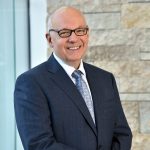 Dr. J. Stephen Jones
Dr. J. Stephen Jones
PRESIDENT AND CEO, INOVA HEALTH SYSTEM, FALLS CHURCH
Named among the top 1% of cancer specialists and urologists in the nation by Castle Connolly, Jones has led Inova Health System since 2018. The regional health system employs more than 20,000 people across its five hospitals and numerous other facilities, including Northern Virginia’s only state and nationally verified Level 1 trauma center.
In 2023, the health system received a $75 million gift from longtime supporters Dwight and Martha Schar to boost its heart and vascular programs. And construction is expected to begin next year on the $1 billion Inova Alexandria Hospital campus, slated to open in 2028 on the former Landmark Mall site.
Before joining Inova, Jones led Cleveland Clinic’s regional hospitals and family health centers. He also is a professor of urology for the University of Virginia and is editor-in-chief of Urology Practice, a journal published by the American Urological Association. He is chair of the American Medical Group Association’s board.
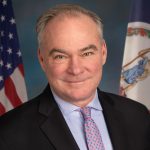 Tim Kaine
Tim Kaine
SENATOR, UNITED STATES SENATE, RICHMOND
A Democratic leader who has served as Richmond mayor and Virginia’s lieutenant governor and governor, Kaine has been the state’s junior U.S. senator since 2013 and is seeking a third term this year. He came to national prominence in 2016 as Hillary Clinton’s running mate during her unsuccessful presidential campaign.
Kaine grew up in Kansas City and graduated from the University of Missouri. He moved to Richmond after meeting his future wife, Anne Holton, at Harvard Law School in the 1980s. He started his political career in 1994 with a Richmond City Council run.
As governor, Kaine dealt with the aftermath of the 2007 Virginia Tech shooting that claimed 32 lives, as well as the 2008 Great Recession, which saw a 7.4% unemployment peak.
As a U.S. senator, Kaine started the bipartisan Senate Career and Technical Education Caucus in 2014, and he is assigned to the Senate’s Budget, Armed Services and Foreign Relations committees. In the past year, Kaine has voiced opposition to the Biden administration’s unilateral decisions to bomb Yemen and transfer arms to Israel without seeking congressional approval.

Christopher D. Kastner
PRESIDENT AND CEO, HUNTINGTON INGALLS INDUSTRIES, NEWPORT NEWS
Kastner has now completed his second year as head of the nation’s largest military shipbuilder, Huntington Ingalls Industries, parent company to Newport News Shipbuilding, Virginia’s largest industrial employer. He was tapped as HII’s president and CEO after previously serving as chief operating officer and chief financial officer. In fiscal 2022, the company reported revenue of $10.7 billion, a 12.1% increase from 2021.
HII had a successful 2023, with record third-quarter revenues of $2.8 billion, up 7.2% compared with third-quarter 2022, and a total backlog of about $49 billion at the end of 2023.
HII was formed in 2011, when parent company Northrop Grumman spun out its entire shipbuilding portfolio, including Newport News Shipbuilding and Pascagoula, Mississippi-based Ingalls Shipbuilding. The companies have remained together, keeping their original corporate identities intact. Prior to becoming an HII exec in 2013, Kastner was vice president and CFO for Ingalls Shipbuilding.
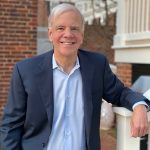 Dr. K. Craig Kent
Dr. K. Craig Kent
CEO, UVA HEALTH; EXECUTIVE VICE PRESIDENT FOR HEALTH AFFAIRS, UNIVERSITY OF VIRGINIA, CHARLOTTESVILLE
A vascular surgeon, Kent joined UVA Health in February 2020, having served previously as dean of the Ohio State University College of Medicine. In December 2023, his contract was extended through Jan. 31, 2030, as the health system prepares to expand significantly.
Kent is responsible for a health system that employs about 16,000 people and includes U.Va. Medical Center, a children’s hospital and schools of nursing and medicine, as well as a network of outpatient clinics across Northern Virginia.
In July 2023, UVA Health announced a strategic partnership with Riverside Health System, acquiring a 5% stake in the Eastern Virginia system. Also, UVA Health will be a major partner in the $350 million Paul and Diane Manning Institute of Biotechnology under construction in Charlottesville.
This year, U.S. News & World Report ranked U.Va. Medical Center the No. 3 hospital in Virginia and rated U.Va. Children’s the state’s top children’s hospital.
Kent earned his medical degree at the University of California, San Francisco. He was also vascular surgery chief at Weill Medical College of Cornell University and Columbia University’s College of Physicians and Surgeons.
 Arie Kotler
Arie Kotler
CHAIRMAN, PRESIDENT AND CEO, ARKO, HENRICO COUNTY
The Henrico-based convenience store chain, the nation’s sixth largest, is now firmly planted in the Fortune 500, having debuted at No. 498 in 2022 and rising to No. 460 in 2023. Kotler has grown the company significantly over the past decade, and it now owns smaller convenience store chains in more than 30 states.
An Israeli native who relocated to the United States in 1997, Kotler founded GPM Investments in 2003, sold the business and reacquired it in 2011. Arko, GPM’s parent, went public in 2020. Today, it operates more than 1,540 stores and gas stations in 30 states, employing 13,000 workers, including 1,800 in Virginia.
Although Arko has been largely successful in its growth, it failed in an attempt to acquire TravelCenters of America last year for $1.4 billion. In 2023, however, Arko closed its 25th acquisition and reported available liquidity of more than $2 billion for future purchases as of the third quarter of fiscal 2023.
In January, Arko hired a new chief financial officer and executive vice president, Robert E. Giammatteo, who succeeded retiring CFO Don Bassell. Arko brought in $72 million in profits in 2022, up 21% from 2021, and held $3.25 billion in assets.
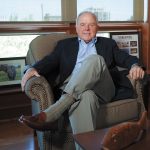 Paul B. Manning
Paul B. Manning
CHAIRMAN AND CEO, PBM CAPITAL GROUP, CHARLOTTESVILLE
Known for their medical philanthropy, Manning and his wife, Diane, donated $100 million in 2023 to create the Paul and Diane Manning Institute of Biotechnology at the University of Virginia, which will focus on research into new medical treatments like cellular and gene therapies, nanotechnology and immunotherapy. Manning has said he hopes the institute will lead to cures for at least “five or six diseases,” including diabetes and genetic blindness. The couple also donated $1 million to U.Va. in 2020 to launch a COVID-19 research program.
Manning started his private equity firm after selling his infant formula company PBM Holdings to Perrigo Co. in 2010 for $808 million. PBM Capital invests in pharmaceutical and life sciences companies developing innovative solutions such as gene therapy, targeted therapeutics and genome engineering.
Manning, who enjoys deep-sea fishing and spending time with his children and grandchildren, earned his bachelor’s degree in microbiology from the University of Massachusetts Amherst and was appointed in 2023 to U.Va.’s board of visitors for a four-year term.

Jacqueline Mars
CO-OWNER, MARS, THE PLAINS
As of February, with a net worth of $39.2 billion, Mars is Virginia’s wealthiest person and the 19th richest person in the United States, according to Forbes. She owns a third of the Mars candy, food and pet care company started by her grandfather, Frank C. Mars. It’s now the largest private company in Virginia and the fourth largest in the country. Known for its Snickers and M&M’s candy offerings, Mars has also seen major success in its pet care sector, including the Pedigree and Royal Canin brands.
In November 2023, the company’s Bidco subsidiary purchased Britain’s largest chocolate maker, Hotel Chocolat, for $662 million.
In 2023, Mars reported $50 billion in sales and 140,000 employees in 80 countries.
Jacqueline Mars’ son, Stephen Badger, has been chairman of the Mars board since 2011. At age 84, Mars keeps a low profile, after having worked for the company for more than 20 years and later serving on its board. A Bryn Mawr College alumna, she serves on the boards for the Washington National Opera and the National Sporting Library & Museum based in Middleburg and is an honorary life trustee of the U.S. Equestrian Team Foundation.
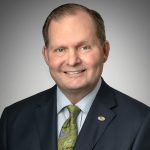 Dennis Matheis
Dennis Matheis
PRESIDENT AND CEO, SENTARA HEALTH, NORFOLK
In 2022, Matheis became CEO of Sentara, an $11 billion not-for-profit health system with 12 hospitals in Virginia and North Carolina, employing 30,000 workers, including 1,375 physicians.
Matheis was previously the head of Sentara’s insurance branch and was president of Anthem’s central region and exchanges before joining Sentara, where he more than doubled the number of health insurance members. A graduate of the University of Kentucky, Matheis also held executive roles at The Cigna Group and Humana, and he serves on the America’s Health Insurance Plans board.
In December 2023, Sentara became the sole owner of Velocity Urgent Care, which has 17 locations in Virginia and nearly 200 employees. Last summer, Sentara opened a medical office building at its $200 million regional campus in Elizabeth City, North Carolina, where it’s building a new hospital expected to open by early 2025.
In 2023, Gov. Glenn Youngkin appointed Matheis to the Governor’s Advisory Committee on Revenue Estimates, which reviews the state’s economic climate.

Jim McGlothlin
CHAIRMAN, THE UNITED CO., BRISTOL
Virginia Business’ 2022 Person of the Year, McGlothlin built a fortune from coal mines and pivoted to hospitality as the coal business began to recede.
A William & Mary alumnus, McGlothlin started out as a lawyer in Grundy before co-founding United Coal in 1970, going on to acquire dozens of smaller coal companies and mines in Appalachia. United Coal grew into a billion-dollar business by the time it was sold in 2009.
McGlothlin continued as chairman, CEO and sole owner of The United Co., which diversified into a hospitality and wealth management company, with activities including real estate development and coal, oil and gas exploration services and holdings including golf courses, RV parks and a stake in the Hard Rock Hotel & Casino Bristol, which opened in a temporary location in 2022. Its permanent, $520 billion location is expected to open in July.
Now in his 80s, McGlothlin owns The Olde Farm Golf Club in Bristol, a Bobby Weed-designed course that is ranked among the nation’s top golf courses. He and his wife, Frances, are among the state’s top art philanthropists and collectors.
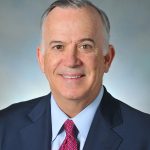 Thomas J. McInerney
Thomas J. McInerney
PRESIDENT AND CEO, GENWORTH FINANCIAL, HENRICO COUNTY
McInerney has been CEO of the Fortune 500 insurance corporation since 2013. Genworth, which provides life, mortgage and long-term care insurance, reported $7.47 billion in revenue for the 12 months ending Sept. 30, 2023, up 1.47% year-over-year.
Overall, 2023 was a tough year for Genworth, which disclosed that up to 2.5 million customers and insurance agents’ personal information had been exposed in a data breach by a Russian cybercrime gang. In March 2023, Genworth settled a lawsuit with policyholders who claimed that the company didn’t inform them that it planned to raise premium rates in the future, after starting to raise rates in 2013. Genworth admitted no wrongdoing in the settlement.
Before joining Genworth, McInerney held executive roles with the ING Group, a Dutch financial services company. A graduate of Colgate University and Dartmouth College’s business school, McInerney donated $1.5 million in 2023 to the William & Mary Global Research Institute, funding a postdoctoral fellowship. He also chairs the board of Gov. Glenn Youngkin’s nonprofit workforce training initiative, Virginia Ready.

William D. ‘Bill’ Nash
PRESIDENT AND CEO, CARMAX, GOOCHLAND COUNTY
Nash started his career at CarMax in 1997 as an auction manager, working his way up to president and CEO in 2016. Founded in 1993 as a subsidiary of electronics retailer Circuit City Corp., the Fortune 500 company is the country’s largest retailer of used cars, reporting $31.9 billion in 2022 revenue and employing more than 30,000 people.
Profits jumped in the third quarter of 2023 to $82 million, compared with $37.6 million in the third quarter of 2022, after the used vehicle seller cut costs in response to lower demand. In October 2023, Nash rang the closing bell at the New York Stock Exchange, celebrating CarMax’s 30th anniversary. Since 1993, the company has sold more than 11 million vehicles at retail and 7 million at auction.
In CarMax’s 2023 Responsibility Report, Nash, a James Madison University alumnus, expounded on his goals of making the company the leading retailer of used electric vehicles and achieving net-zero carbon emissions by 2050.
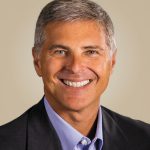 Christopher J. Nassetta
Christopher J. Nassetta
PRESIDENT AND CEO, HILTON WORLDWIDE HOLDINGS, McLEAN
Since 2007, Nassetta has been the head of Hilton, one of the world’s largest hoteliers, with more than 7,500 properties worldwide and new hotels opening this year in Nashville and Atlanta, among other locations around the globe.
In the third quarter of 2023, Hilton reported $2.67 billion in revenue, up 12.8% from a year earlier. Nassetta said during the company’s earnings call that group business, leisure and business travel were performing better too, exceeding 2019 levels for the first full quarter since the pandemic.
Hilton, which opened more than 100 hotels in the second half of 2023, returned to the Fortune 500 list last year following a two-year absence amid the industry’s pandemic downturn. “People are out traveling for business again. They’ve got a lot more mobility,” Nassetta told CBS News.
A graduate of the University of Virginia’s McIntire School of Commerce, Nassetta previously served as president and CEO at Host Hotels & Resorts. He chairs the U.S. Travel Association board and sits on the board of CoStar Group.
 Phebe N. Novakovic
Phebe N. Novakovic
CHAIRMAN AND CEO, GENERAL DYNAMICS, RESTON
Since 2013, Novakovic has led the world’s sixth largest aerospace and defense company, with 105,000 employees worldwide and revenue of $42.3 billion in fiscal 2023, up 7.3% from 2022.
Ranked No. 29 on Forbes’ 2023 World’s 100 Most Powerful Women list, Novakovic is a Smith College and University of Pennsylvania Wharton School graduate and was Virginia’s fifth highest-paid executive in 2022, receiving $21.4 million in total compensation.
Novakovic previously worked for the CIA, the federal Office of Management and Budget, and two deputy defense secretaries during the Clinton administration. In 2001, she joined General Dynamics, and under her leadership, the corporation won the Navy’s largest-ever contract, $24.2 billion, to build nuclear submarines. In 2023, General Dynamics’ work backlog reached a company record $91.4 billion.
She serves on the Center for Strategic and International Studies’ board and chairs the Association of the United States Army.
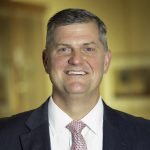 Edward A. Pesicka
Edward A. Pesicka
PRESIDENT AND CEO, OWENS & MINOR, MECHANICSVILLE
In December 2023, Pesicka announced a new five-year strategic plan for Owens & Minor after the Fortune 500 health care logistics and supplies company saw a rocky first half of the year.
Amid a post-pandemic drop in demand for personal protective equipment and other medical supplies, Owens & Minor lost $52.7 million in the first half of 2023. Nevertheless, the company recorded $7.67 billion in revenue for the first three quarters of 2023, up from $7.4 billion during the same period in 2022, with Pesicka estimating that the year’s revenue would be in a range of $10.3 billion to $10.4 billion, up from $9.95 billion in 2022.
Unveiling the new strategic plan, Pesicka said it would target 20% compounded earnings growth between 2024 and 2028, building on the momentum of its success in the home health care market with its Patient Direct segment, which brought in $1.24 billion in revenue for the first half of 2023.
CEO since 2019, Pesicka previously served as chief commercial officer and senior vice president at Thermo Fisher Scientific. He earned a bachelor’s degree from Muskingum University and an MBA from Case Western Reserve University.

Horacio D. Rozanski
PRESIDENT AND CEO, BOOZ ALLEN HAMILTON, McLEAN
Rozanski joined Fortune 500 global management, technology, engineering and consulting firm Booz Allen as an intern in Buenos Aires in 1991, ultimately rising to CEO in 2015.
Booz Allen employs 31,925 workers worldwide, including 10,707 in Virginia, and reported fiscal 2023 earnings of $9.3 billion as well as a $31.2 billion backlog.
Rozanski is credited with the formation of Booz Allen’s $100 million venture capital arm in 2022. In May 2023, the Defense Department awarded Booz Allen a five-year contract valued at $919 million for Army combat support. In August 2023, the company launched a new business services delivery hub in Norfolk, expected to create 120 jobs.
Last July, the company agreed to pay the U.S. government $377.4 million to settle allegations of improperly billing commercial and international costs to its government contracts, according to the Justice Department. Booz Allen did not admit liability in the agreement.
Rozanski chairs the Children’s National Hospital’s board and is a member of the U.S. Holocaust Memorial Museum’s Committee on Conscience.
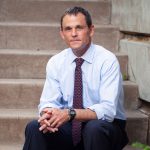 James E. Ryan
James E. Ryan
PRESIDENT, UNIVERSITY OF VIRGINIA, CHARLOTTESVILLE
Ryan, who became the University of Virginia’s ninth president in 2018, has spearheaded several growth initiatives at the state’s flagship university, including the School of Data Science, a new performing arts center and the Karsh Institute of Democracy — all projects funded by donors, including a record 2019 gift of $120 million from alumni couple Jaffray and Merrill Woodriff to launch the data science school.
In 2023, U.Va. announced a $100 million donation from Charlottesville philanthropists Paul and Diane Manning toward establishing the $350 million Paul and Diane Manning Institute of Biotechnology. U.Va. will contribute $150 million to the center, and the state has allocated $50 million in initial investments.
Ryan also has dealt with significant challenges during his presidency, including the November 2022 mass shooting that claimed the lives of three football players and injured two other students.
Ryan, who previously served as dean of Harvard’s Graduate School of Education, was a first-generation college student who graduated summa cum laude from Yale University and was first in his U.Va. law class. He was elected in June 2023 as chair of the Atlantic Coast Conference’s board of directors, a two-year term.
 Timothy Sands
Timothy Sands
PRESIDENT, VIRGINIA TECH, BLACKSBURG
A scientist whose research focused on light-emitting diodes, Sands joined Virginia Tech in 2014 after serving as interim president at Purdue University.
During his tenure, Sands, who renewed his contract through 2027, has been leading development of Virginia Tech’s $1 billion Innovation Campus in Alexandria for graduate computer science and engineering programs.
Virginia Tech has also received notable donations in recent years, including $50 million from Fortune 500 aerospace and defense company Boeing to foster diversity at the Innovation Campus. Also, the school received $50 million for the Fralin Biomedical Research Institute at VTC in Roanoke from Virginia philanthropist Heywood Fralin, and last September, $50 million more from the Red Gates Foundation.
In July 2023, Sands announced that Virginia Tech would end legacy preferences in admissions, as well as the option of early decision, following the U.S. Supreme Court’s June decision to end affirmative action.
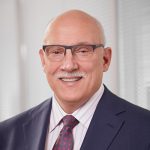 Stu Shea
Stu Shea
CHAIRMAN, PRESIDENT and CEO, PERATON, RESTON
A fixture in the national security industry, Shea has led the expansion of the private company into a major defense contractor through a series of acquisitions, including the 2021 purchase of Northrop Grumman’s federal IT and mission support services business.
In 2023, Peraton moved its headquarters from Herndon to Reston, which serves as a hub for 5,000 of the company’s 19,000 employees. In February 2023, Peraton won one of eight Navy contracts that is expected to be worth $4 billion over the next 10 years, and this January, the Army Cyber Command awarded a $889 million contract to provide support to the Cyber Command headquarters. In December, the company hired a new chief financial officer, Ken Sharp, who will report to Shea.
As a young software engineer, Shea tapped his expertise in geography and geology to design some of the earliest computer mapping systems for the CIA, the National Security Agency and the U.S. Air Force.
Shea founded the U.S. Geospatial Intelligence Foundation and is a board member for the National Intelligence University Foundation and Riverside Research.
 Julie Sweet
Julie Sweet
CEO AND CHAIR, ACCENTURE, ARLINGTON COUNTY
One of the world’s most powerful women, Sweet has been global CEO of IT services and consulting company Accenture since 2019 and became its chair in 2021. She joined the Fortune Global 500 company in 2010 and previously held roles including CEO of Accenture’s business in North America from 2015 to 2019. Accenture has no formal geographic headquarters, but Sweet has an office in Arlington, from which she leads the company’s 733,000 employees worldwide.
Sweet spoke in January about artificial intelligence at the 54th annual meeting of the World Economic Forum in Davos, Switzerland. Last year, Accenture announced a three-year, $3 billion investment in artificial intelligence, and the same month, the company partnered with Immersive Labs to fill approximately 1 million entry-level cybersecurity jobs. In March 2023, though, Accenture cut 19,000 jobs worldwide, about 2.5% of its workforce. Accenture’s fiscal 2023 revenue was $64.1 billion, up 8% from the previous year.
Sweet ranked second place on Fortune’s Most Powerful Women in Business list in 2023, and No. 11 on Forbes’ list of the world’s most powerful women, two slots above MacKenzie Scott and six places below Taylor Swift.
 Toni Townes-Whitley
Toni Townes-Whitley
CEO, SCIENCE APPLICATIONS INTERNATIONAL CORP., RESTON
In October 2023, Townes-Whitley succeeded Nazzic S. Keene as SAIC’s CEO and replaced Keene on the Fortune 500 federal contractor’s board in February.
Townes-Whitley came to the $7.7 billion, 24,000-employee SAIC from Microsoft, where she served as president of U.S. Regulated Industries. She previously led CGI Federal and held management roles at Unisys. At Microsoft, she helped build the company’s ethics framework for artificial intelligence and sponsored a Microsoft group for Black and African employees.
In December, SAIC announced a reorganization, with its defense and civilian sector and national security and space sector replaced by five new business groups: Army, Navy, Air Force and combatant commands; space and intelligence; and civilian, including health, state and local businesses. Four senior vice presidents received promotions, while two sector presidents departed.
A graduate of Princeton University and a former Peace Corps volunteer in Gabon, Townes-Whitley serves on Nasdaq’s board and is one of two Black women Fortune 500 CEOs.
 Kathy Warden
Kathy Warden
CHAIRMAN, CEO AND PRESIDENT, NORTHROP GRUMMAN, FALLS CHURCH
Warden was named CEO of the world’s third largest aerospace and defense company in 2019 after serving as its president and chief operating officer. In 2023, Northrop Grumman reported $39.3 billion in sales, a record $84.2 billion backlog and projected growth through 2026.
Ranked No. 38 on Forbes’ 2023 World’s 100 Most Powerful Women list, Warden previously worked for General Dynamics and Veridian before joining Northrop Grumman in 2008.
In February, NG broke ground on the $200 million advanced electronics manufacturing and testing facility it’s building in Waynesboro, which is expected to create 300 jobs.
Warden and her husband, Eric, both James Madison University alumni, established a $1.5 million scholarship match program for Pell Grant-eligible JMU students in 2022.
She serves on the boards of Merck and Catalyst, an organization that focuses on making workplaces more women-friendly. She also chairs the Greater Washington Partnership board.
 Mark Warner
Mark Warner
SENATOR, UNITED STATES SENATE, ALEXANDRIA
Like his junior colleague, Tim Kaine, Warner served as governor of Virginia before being elected to the U.S. Senate. He’s now in his third term as Virginia’s senior senator.
A moderate Democrat, Warner chairs the Senate Intelligence Committee and is vice chair of the Senate Democratic caucus. He also serves on Finance subcommittees that govern energy, natural resources, infrastructure and international trade.
Warner grew up in Illinois and Connecticut, and he earned his law degree at Harvard University in 1980. After starting two unsuccessful businesses in the 1980s, he struck gold in cell phones, co-founding Nextel Communications and Capital Cellular. His net worth reportedly exceeds $200 million, and Warner has been active in promoting the manufacturing of semiconductors, sponsoring the 2022 CHIPS and Science Act, which includes $280 billion to boost domestic research and manufacturing of semiconductors.
In November 2023, Warner blasted a decision to place the new FBI headquarters in Maryland instead of Springfield as “corrupt,” and later that month, the General Services Administration launched an investigation into the decision.
 Poul Weihrauch
Poul Weihrauch
PRESIDENT AND CEO, MARS, McLEAN
Since taking the reins of the family-owned candy and pet food giant in 2022, Weihrauch has set a goal of doubling the company’s sales by 2033. With $50 billion in sales in 2023, Mars is the largest privately held company in Virginia and the fourth largest in the nation. It has approximately 140,000 employees in 80 countries.
In November 2023, Mars’ Bidco subsidiary purchased Britain’s largest chocolate maker, Hotel Chocolat, for $662 million.
Weihrauch joined Mars in 2000 as European brand leader for Snickers candy bars and worked his way up the corporate ladder, becoming president of food and multisales and then president of Mars’ global pet care brand. He previously worked for Nestlé in sales and marketing and started his career at Stimorol Chewing Gum in his home country, Denmark.
Mars has committed to invest $1 billion over the next three years to address greenhouse gases, including the use of more recycled materials in its packaging.
 Glenn Youngkin
Glenn Youngkin
GOVERNOR, COMMONWEALTH OF VIRGINIA, RICHMOND
Now more than halfway through his term as Virginia’s 74th governor, Youngkin gave it his best effort but his party lost control of the General Assembly in the November 2023 state elections, leaving him with a split government for the rest of his tenure.
Nonetheless, the governor is pushing forward with several agenda items, including more funding for industrial site preparation. The governor also has proposed allocating $90 million to create “Virginia’s Research Triangle,” a network including the University of Virginia, Virginia Commonwealth University and Virginia Tech to boost biotech and pharmaceutical research and development, and a new $2 billion entertainment district in Alexandria, in which the Washington Capitals and the Wizards would move from Washington, D.C., to Virginia.
After growing up in Richmond and Virginia Beach, Youngkin attended Rice University on a basketball scholarship and earned an MBA from Harvard Business School, later becoming co-CEO of The Carlyle Group. With a reported net worth exceeding $250 million, he is the wealthiest governor in state history and donates his state salary to charity.
Editor’s note: This story has been updated from the version published in the March 2024 issue to reflect events that occurred after the print magazine went to press, including Capital One’s announcement of its intended acquisition of Discover Financial Services.





















































